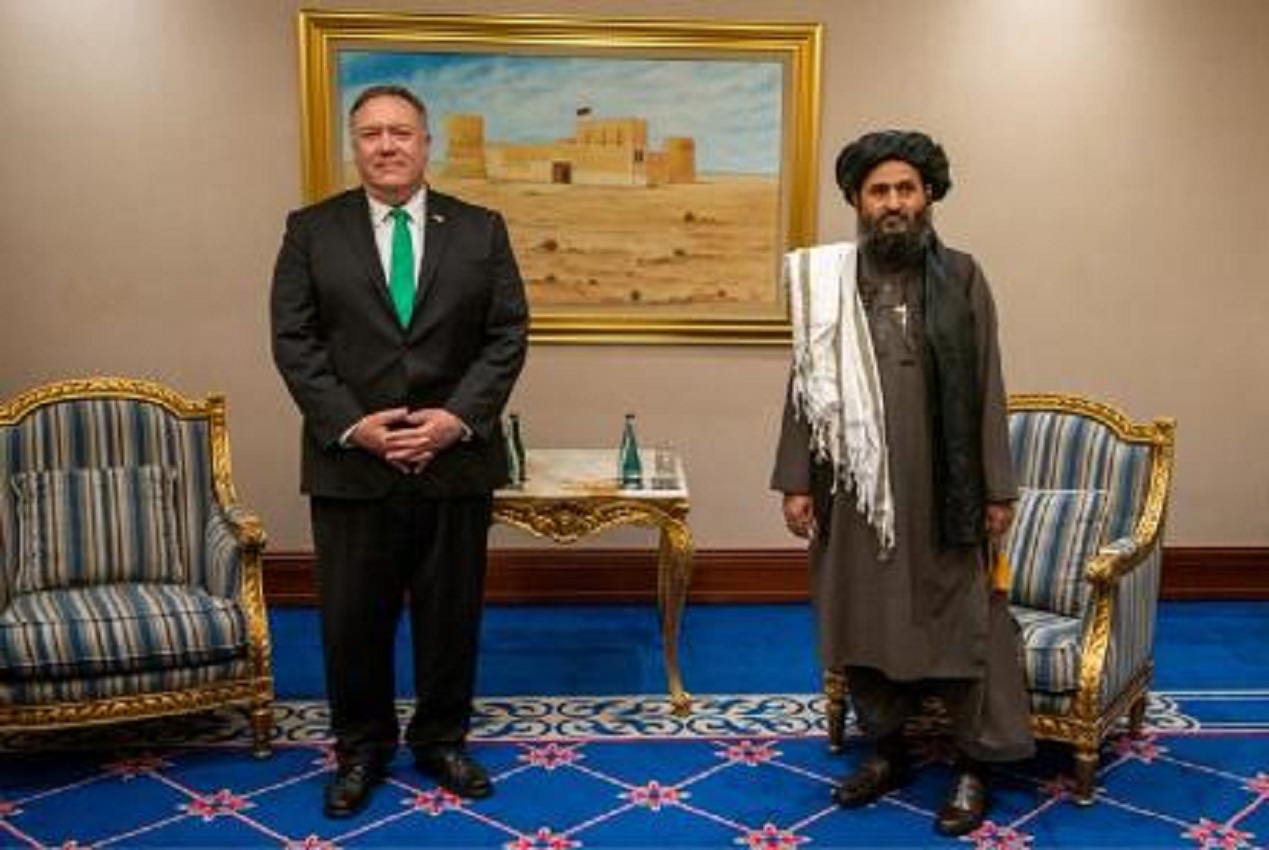The al-Qaeda led-terrorist attack on September 11, 2001, impelled America to wage ‘global war on terror’. Consequently, the United States toppled the Taliban regime (1996-2001) in Afghanistan for giving sanctuary to the terrorist group, al-Qaeda. On September 12, 2020, the world has come to a full circle as the Islamic Republic of Afghanistan kicked off negotiations with the Taliban in Doha to end the ongoing conflict in the country. If the talks succeed, the power structure in Kabul will include the Taliban. On this occasion, Mike Pompeo, US Secretary of State, said: “The US will never forget the September 11 attack, but Washington welcomes the Taliban commitment not to host international terrorist groups, including al-Qaeda.”1 Ironically, in May 2020, the UNSC report stated that the Taliban still maintains linkages with al-Qaeda and other terrorist groups.
Pakistan
Undeniably, at this juncture, the political solution is the only way out of the Afghan conundrum. However, another irrefutable and perhaps an overlooked fact is that Washington had lost any chance of winning the ‘war on terror’ in Afghanistan the moment it joined efforts with Pakistan- a state that pursues terrorism as an instrument of foreign policy. There have been numerous reports which give a detailed account of how Rawalpindi since 2001 has aided and abetted the Taliban fighters and its top leadership within its territory. Nevertheless, at the inauguration session of the intra-Afghan dialogue, Pakistan Foreign Minister Shah Mehmud Qureshi stated: “Pakistan has fully facilitated the process that culminated in the US-Taliban Peace Agreement in Doha on February 29, 2020, and has reached this juncture.”2 By hedging its bets against the Taliban, Rawalpindi not only deceived the American administration but became indispensable for any future deal with the insurgent group.
Ceasefire and Violence
For the Afghans, the road ahead is long and arduous. It may take years for the peace process to finally culminate into a mutually agreed desired end state in Afghanistan. The most pressing concern that the two negotiating sides should resolve is the issue of the ceasefire and ongoing violence in the country. With the initiation of intra-Afghan dialogue, all the countries, including India, should press the Taliban for a humanitarian ceasefire in Afghanistan. The continuing violence could deepen the mistrust between two sides and thereby derailing the peace talks. For instance, in September 2020, just before the beginning of intra-Afghan negotiations, the Taliban fighters attacked Afghanistan’s northeastern Panjshir province for the first time in the last 19 years.3 Such instances raise serious concerns about the sincerity of the Taliban to find a diplomatic solution to the conflict. Moreover, the recent attack on Vice President Amrullah Saleh, although denied by the Taliban, could sharpen the rift between the two negotiating parties. According to Afghanistan’s Defence Ministry, the insurgent group launched attacks in 18 of the country’s 34 provinces on the eve of the Doha talks.4
Women Issues and Minority Rights
Another area of concern is the rights of women and minorities in the country. The Taliban regime was known for its gruesome human rights violations, especially concerning women. The neo-Taliban seems more open to women rights and education, however, only within Islamic principles. Since Islam is open to wide-ranging interpretations, the Taliban can exploit it to curtail women rights in the country. Today, women are participating in every front in Afghanistan, includingthe government sector, entrepreneurship, and security forces as well. However, out of a 20-member negotiating team, the Afghan government has included only three women for the Doha talks- Habiba Sarabi, the first female governor of an Afghan province; Fawzia Koofi, former deputy speaker of Afghanistan’s Parliament; Sharifa Zurmati, member of Parliament.5 Despite the progress in the last 18 years on women issues, the minimal representation in the negotiating team indicates the struggle of Afghan women in a deeply conservative and patriarchal society. Expectedly, the Taliban negotiating team did not include any women. On this issue, Taliban spokesperson, Mohammad Naeem said: “about the absence or presence of women- the main goal is to establish an Islamic government in which the rights of all individuals are guaranteed, and Islam has guaranteed them.”6
Taliban’s Worldview?
Until now, the Taliban has not shared its worldview or its future aspirations for Afghanistan in clear terms. The statements of the Taliban leaders and the infamous op-Ed by Sirajuddin Haqqani in The New York Times stresses the establishment of “pure Islamic government” in Afghanistan.7 Besides, the Taliban has crafted progressive statements on human rights, women issues, and terrorism to cater to an international audience. It is not easy to verify any of these statements in the short and medium-term. However, it helps the group to gain international legitimacy, which it craves.
Moreover, the US troop withdrawal from Afghanistan has given the insurgent group a sense of victory. That is why it is more likely that the Taliban will begin the talks with a maximalist position on every significant issue. However, for the talks to succeed, the two sides will have to strike a compromise on issues including- the kind of state they want to build- Republic or Emirate? Such issues will also test the consensus and unity within the Taliban. Probably this is why the insurgent group has appointed Mawlawi Abdul Hakim- the Chief Jurist of the group, as the head of their 21-member negotiating team. Having an old-time religious figure as the head of the negotiating team will help the Taliban to deal with the inevitable backlash within the group on critical issues.
Afghan Government without Leverage
The Afghan government has entered the intra-Afghan dialogue, with almost no leverage. With the dwindling American support, the road ahead for the Kabul government is challenging. It is not easy to gauge whether the US will rescue the Kabul government in case a deadlock, which is inevitable, arises in the talks. Perhaps, once the election cycle gets over in Washington, there is a possibility that the US will have a greater political engagement with Kabul.
In a confidence-boosting measure for the Afghan government, NATO Senior Civilian Representative in Afghanistan, Ambassador Stefano Pontecorvo has stated that “NATO allies and partners remain determined to assist Afghanistan towards a peaceful and secure future. Our Resolute Support mission to train, advise and assist the security forces continues, alongside financial support to the security sector.”8 However, as Mujib Mashal writes, during the inaugural session in Doha, General Austin S. Miller, the commander of US and NATO forces in Afghanistan, “walked under the chandeliers and across the hall to the Taliban side and offered greetings — an image that made clear his direct war with the Taliban was largely over.”9 The continuous security and financial aid by the international community will ensure the survival of the Kabul government as it negotiates the country’s future with the Taliban. Without adequate financial support, the dispensation in Kabul will not be able to hold on its own against the Taliban.
India’s Role
In this background, the role of India also assumes critical importance. As Indian Foreign Minster S. Jaishankar stated: “the friendship of our peoples is a testimony to our history with Afghanistan. No part of Afghanistan is untouched by our 400-plus development projects.”10 While addressing the inaugural of intra-Afghan dialogue virtually, he further said, “the peace process must be Afghan-led, Afghan-owned and Afghan-controlled, respect national sovereignty and territorial integrity of Afghanistan, promote human rights and democracy, ensure the interest of minorities, women and the vulnerable, effectively address violence across the country.”11 India’s people-oriented approach in Afghanistan has earned deep admiration and affection for New Delhi among all the sections of Afghan society. That is why, contrary to various prevalent views, India will continue to remain a significant player in Afghanistan. Any ruling dispensation in Kabul cannot overlook the impact of India’s development projects in the country. Nevertheless, as Afghanistan enters into a new phase of forging reconciliation, social cohesion and peace, India must strengthen its diplomatic, military and human development aid to Kabul.
Endnotes
- Doha Talks Called Historic Opportunity for Afghan Peace, TOLO News, 12 September 2020, URL: https://tolonews.com/afghanistan-166247
- Ibid
- Taliban Hits Northeast Afghan Province For First Time In Two Decades, Radio Free Afghanistan, 8 September 2020, URL: https://gandhara.rferl.org/a/taliban-hit-northeast-afghan-province-for-first-time-in-two-decades/30827246.html
- MujibMashal, Afghanistan Peace Talks Open in Qatar, Seeking End to Decades of War, The New York Times, 12 September 2020, URL: https://www.nytimes.com/2020/09/12/world/asia/afghanistan-taliban.html
- MujibMashal, Afghanistan Peace Talks Open in Qatar, Seeking End to Decades of War, The New York Times, 12 September 2020, URL: https://www.nytimes.com/2020/09/12/world/asia/afghanistan-taliban.html
- 2 Afghan Govt Negotiators, One a Woman, Absent from Talks, Tolo News, 13 September, 2020, URL: https://tolonews.com/afghanistan-166290
- Taliban Head Seeks 'Pure Islamic Govt,' But Not 'Monopoly', Tolo News, 28 July 2020, URL: https://tolonews.com/afghanistan/taliban-head-seeks-pure-islamic-govt-not-monopoly
- NATO Determined to Assist Afghanistan Towards Lasting Peace, TOLO News, 11 September 2020, URL: https://tolonews.com/index.php/opinion/nato-determined-assist-afghanistan-towards-lasting-peace
- MujibMashal, Afghanistan Peace Talks Open in Qatar, Seeking End to Decades of War, The New York Times, 12 September 2020, URL: https://www.nytimes.com/2020/09/12/world/asia/afghanistan-taliban.html
- India attends intra-Afghan talks in Doha, Jaishankar says peace process must be Afghan-led, The Indian Express, 12 September 2020, URL: https://indianexpress.com/article/india/india-to-attend-intra-afghan-talks-in-doha-today-jaishankar-to-join-virtually-6592958/
- Ibid
(The paper is the author’s individual scholastic articulation. The author certifies that the article/paper is original in content, unpublished and it has not been submitted for publication/web upload elsewhere, and that the facts and figures quoted are duly referenced, as needed, and are believed to be correct). (The paper does not necessarily represent the organisational stance... More >>
Image Source: https://tolonews.com/sites/default/files/styles/principal_article_image/public/mullah-beradar-pompeo.jpg?itok=htKRg72j










Post new comment